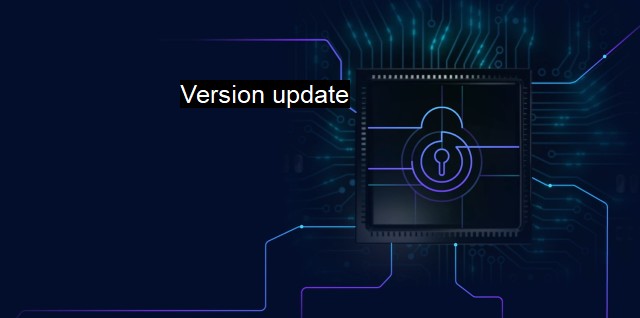What is Version update?
The Importance of Version Updates in Cybersecurity and Antivirus: Protecting Confidential Data against the Latest Threats
A "Version Update", generally referred to as a software update or patch, is a small-scale modification of a rooted framework, application, or utility software program. Its purpose is to either enhance current features of the software, rectify any bugs present, or create new functionalities, making the application or software platform more efficient and improved than its predecessor. these modifications fundamentally aim to optimize the user experience without transforming the software's core functionality.The context of cybersecurity precisely amplifies the importance of such version updates, chiefly because cyber threats continually evolve. Specifically, hackers are ceaselessly searching for and discovering novel system vulnerabilities, designing more complex malware, or devising advanced phishing techniques to breach systems. Simultaneously, efforts in combating these security breaches are being undertaken. One such effort is the occasioned release of version updates which helps manage these vulnerabilities.
Version updates aren't just supplements or enhancements like they are for standard software. They are a critical armor and weapon deployed in the constant back-and-forth battle between online security systems and the sophisticated digital threats they encounter. These updates rectify detected loopholes, improve encryption methodologies, or simply mimic and adopt identified hacking mechanisms to covertly trap invaders.
Significantly, with the ever-increasing dependency on digital systems personal, economic, or socio-political walks of life, online secure systems make version updates a critical factor in their existence, operability, and quality of service. This need transcends to the user realms too: users are not merely advised to regularly update their versions — it becomes necessary for overall system sustainability to pay attention to available updates and install them promptly.
Another context where version updates have found of substantial significance is antivirus software. An antivirus program isn't a fire-and-forget entity: it must be updated continually to remain effective. That's because the cyber threat landscape changes constantly. Whether it's an intricate ransomware attack or phishing scheme or the invention of a novel forms of malware, the world of digital threats similarly evolves.
Since antivirus software has been designed specifically to locate, intercept, and destroy such digital threats, these must mirror the very evolution referred to above to prove their value. Just like inoculations devised for real bacteria and viruses, antivirus programs need regular updates to maintain their capability to detect newer threats, manage their penetration, and ensure cyber hygiene.
All these antivirus program version updates could be classified equally: to some extent, routine updates optimally supplement the existing threat prevention capability of the antivirus software, whereas the crucial version update releases improve the core antivirus software and modify its approach to contain the imminent new cyber threats.
The concept of version updates in the cybersecurity and antivirus context brews strong relevance. Building the resilience of our systems against cyber threats is increasingly down to how often an IT user takes note of available version updates and how promptly they install these. Regrettably, a pattern, where such version updates are ignored or delayed, signifies potential system vulnerabilities, ineffective or nonoperational antivirus tools, and substandard cybersecurity protection, among other complications. Hence, version updates should form an inherent routine for every global digital citizen, alongside practices like safe browsing or good password hygiene. They are a barrier that guarantees stability, reliability, and above all, safety in the persistently transforming and challenging digital ecosystem.

Version update FAQs
What is a version update in the context of cybersecurity and antivirus protection?
A version update in the context of cybersecurity and antivirus protection is an update to the software that is designed to enhance its current features or add new ones. It is important to keep your antivirus software up-to-date to ensure maximum protection against emerging threats.Why is it important to install version updates for antivirus software?
It is important to install version updates for antivirus software because they often contain critical security patches and bug fixes that can prevent your system from being compromised by cyber threats. New updates may also include new functionality and performance improvements that increase the efficiency and effectiveness of your antivirus protection.How often should I update my antivirus software?
It is recommended to update your antivirus software as soon as updates become available to ensure maximum protection from newly discovered security threats. You can set your antivirus software to automatically update, or you can check for updates manually on a regular basis.What should I do if I am having trouble installing a version update for my antivirus software?
If you are having trouble installing a version update for your antivirus software, try restarting your computer and performing the update again. If the problem persists, check to see if there are any conflicting programs running on your computer that may be interfering with the update process. If all else fails, contact the antivirus software vendor's support team for assistance.| | A | | | B | | | C | | | D | | | E | | | F | | | G | | | H | | | I | | | J | | | K | | | L | | | M | |
| | N | | | O | | | P | | | Q | | | R | | | S | | | T | | | U | | | V | | | W | | | X | | | Y | | | Z | |
| | 1 | | | 2 | | | 3 | | | 4 | | | 7 | | | 8 | | |||||||